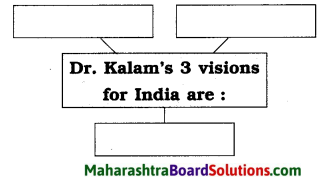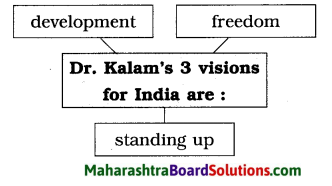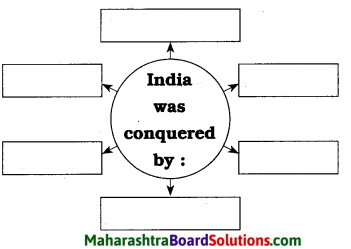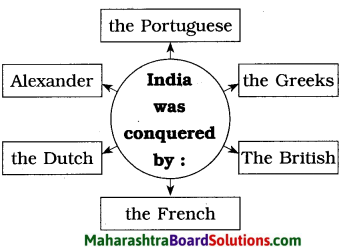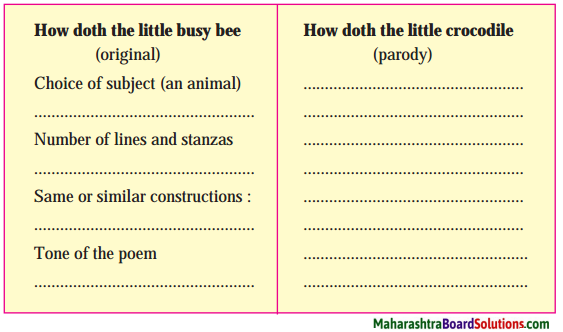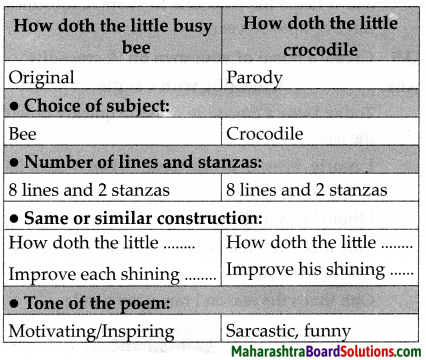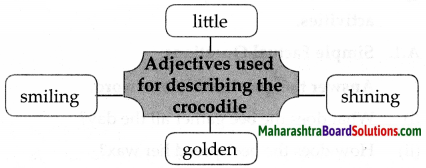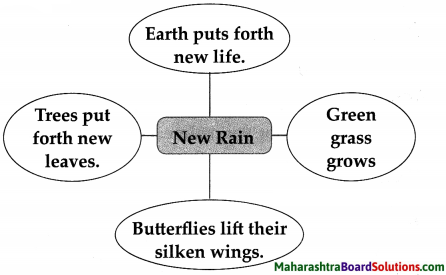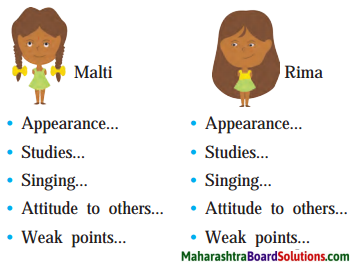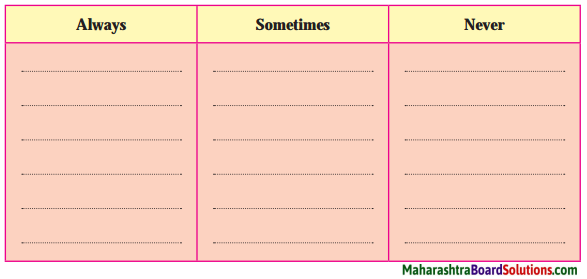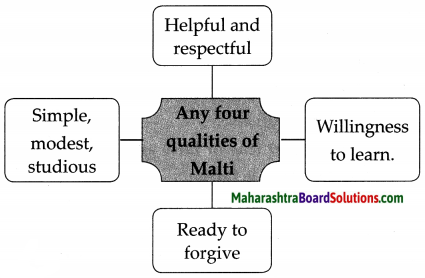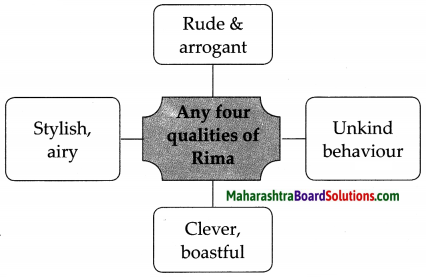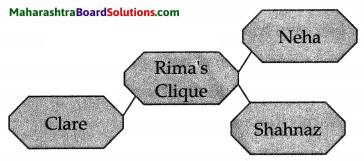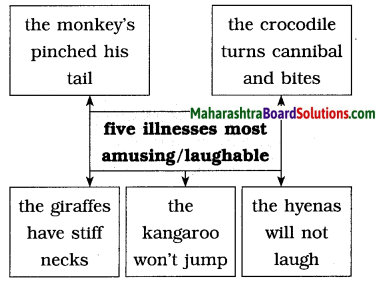Std 8 English Lesson 1.4 Revathi’s Musical Plants Question Answer Maharashtra Board
Balbharti Maharashtra State Board Class 8 English Solutions Chapter 1.4 Revathi’s Musical Plants Notes, Textbook Exercise Important Questions and Answers.
Class 8 English Chapter 1.4 Revathi’s Musical Plants Textbook Questions and Answers
Warming Up
1. Discuss in groups and share your answers with the class:
Question 1.
Can you name the famous musician in Emperor Akbar’s court, who could perform miracles, when he sang different Ragas?
Answer:
Tansen
![]()
Question 2.
What miracles could he perform with his music?
Answer:
It is said that Tansen could create rain and fire just through his music. If he sang the Raga Deepak, the area around ; him would catch fire. If he sang Megha ; Malhar, it would begin to rain. If he sang an evening raga during daytime, the sunlight i would diminish and it would look like it j was dusk already.
Question 3.
What impact does music have on ! human beings?
Answer:
Music can make human beings happy, sad, nostalgic, mournful, etc. It can soothe them when they are stressed. It can also convey a lot of emotions like love, anger, etc. that may not be conveyed easily through words.
Question 4.
Do you think that music can have an impact on animals, birds and even | plants?
Answer:
Yes, definitely. It has already been proved by Jagdish Chandra Bose that plants respond to music. It is said that cows give more milk if they listen to good music. Our folklore is full of instances of snakes swaying to the music played by snake charmers.
2. Affirmative and Negative sentences:
Read the sentences below and spot the difference in their framing:
1. (a) I could not complete the work.
(b) I failed to complete the work.
2. (a) There is no sense in what you say.
(b) There is hardly any sense in what you say.
![]()
3. (a) He said he wouldn’t go.
(b) He refused to go.
You will observe that sentences marked (a) and (b) convey the same meaning. But in all sentences marked (a) there are negative words (no, not, wouldn’t) whereas the ones marked (b) do not have them.
Negative words are those that convey a negative meaning.
For example: never, no, neither, nor, not, cannot, don’t, isn’t, nothing etc.
If a sentence contains Negative words, it is called a Negative Sentence.
If a sentence does not contain any Negative word, it is called Affirmative sentence.
Note: While interchanging Negative and Affirmative sentence, the meaning and tense must not change.
You must use Negative words in the sentence, while transforming from Affirmative to Negative.
You may use words like hardly I fail to I refuse / reject / avoid / prohibit / without / ban etc., while changing Negative sentences to Affirmative.
Say whether the following sentences are Affirmative or Negative ones:
Question 1.
We must avoid hurting others.
Answer:
Affirmative
Question 2.
She didn’t offer me any help.
Answer:
Negative
Question 3.
Never give up hope.
Answer:
Negative
Question 4.
You must keep away from bad company.
Answer:
Affirmative
![]()
Question 5.
There is nothing in the bag.
Answer:
Negative
Question 6.
Entry is prohibited, without permission.
Answer:
Affirmative
1. Read the story and complete the following:
Question a.
At first, Revathi’s plants did not look normal and healthy because of _______.
Answer:
they had pale green leaves and their growth was stunted due to insufficient sunlight.
Question b.
When Revathi played her favourite raga, the plants began to move because _____.
Answer:
they liked the music she was playing.
Question c.
Revathi’s grief knew no bounds because _________.
Answer:
she could not find her pot of balsam plants.
Question d.
Revathi was confident of proving her ownership of her pot of plants because________.
Answer:
she knew that her plants loved music and would respond to her favorite raga. They would bend their stems towards her, proving that they were hers.
![]()
Question e.
Revathi won the prize for the ‘Best Plant’ because of ______.
Answer:
her plants were the best looking and the healthiest.
2. Answer in your own words:
Question a.
What did Revathi discover about her balsam plants?
Answer:
Revathi discovered that her balsam plants were not only taller and healthier than the other balsam plants, but they had started flowering earlier too. The flowers were big and brightly coloured, and one of the plants had an unusual kind of flower. She also discovered that while the plants liked her favourite tune, they did not like the tune with a quick rhythm.
Question b.
Why did Revathi decide to keep her new knowledge ‘a secret’?
Answer:
Revathi decided to keep her new knowledge a secret perhaps because she felt that it was something only between her and her beloved plants, whom she considered her friends. or perhaps she felt that nobody would believe her if she mentioned that her plants were music lovers.
Question c.
How did the plants respond when Revathi played her favourite tune?
Answer:
When Revathi played her favourite tune on her violin, the plants all bent their stems towards her even though there was no breeze.
![]()
Question d.
How did the plants react to the fast rhythmic music?
Answer:
When Revathi played a tune with a quick rhythm, the plants turned away from her as though they did not like what she was playing.
Question e.
How did Revathi prove to the organisers of the competition that the plants truly belonged to her?
Answer:
When Revathi played her favourite tune, the plants bent their stems towards her as though they wanted to touch her in their happiness. This convinced the organisers that the plants were hers.
Question f.
What helped Revathi to claim her plants her belief in magic or the belief in her convictions? Explain your choice.
Answer:
Her belief in her convictions helped Revathi to claim her plants. She was sure that her plants were music lovers and would respond to her favourite raga as they had done before. There was no magic involved. It was a fact.
3. A. An ord chain consists of words of a certain category that begin with the letter, that the previous word has ended with.
Complete the word chain adding Four Nouns from the text.
Music → courtyard → ………
Answer:
music → courtyard → days → surprise → evening → grief.
![]()
3. B. Add the appropriate Prefix to make the following words opposite in meaning.
- continue
- possible
- certain
- definite
- believe
- important
- place
- known
- regular
Answer:
- Discontinue
- Impossible
- Uncertain
- Indefinite
- Disbelieve
- Unimportant
- Displace/Misplace
- Unknown
- Irregular
3. C. Use the following expressions to make sentences of your own:
Question 1.
make up one’s mind
Answer:
make up one’s mind – One should think carefully before one makes up one’s mind about anything important.
Question 2.
struck as odd
Answer:
struck as odd: My friend’s continuous laughter on seeing her marks struck me as odd.
![]()
Question 3.
knew no bounds
Answer:
knew no bounds: My joy knew no bounds when I saw the little puppy on my bed.
Question 4.
flash across one’s mind
Answer:
Flash across one’s mind: When Sonam saw the tears in Dia’s eyes, it flashed across her mind that there was some problem.
Question 5.
to surmise
Answer:
to surmise: When the teacher saw Naomi crying, she surmised that she had failed ¡n the test.
Question 6.
not to deter
Answer:
not to deter: The loss of a leg did not deter Sudha Chandran from dancing.
4. Imagine there is a ‘Best Plant’ Competition in the locality /colony where you live. Frame a Notice about the same, in the form of an attracti’e poster.
Cover the following points.
Name of the organisation.
Name of the Contest.
Day, Date, Venue.
Who can participate.
Prizes.
Contact details for further enquiry.
Answer:
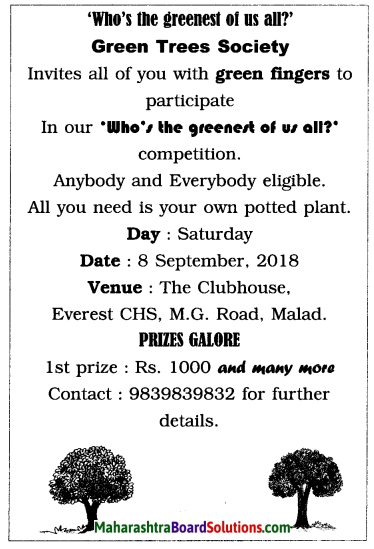
5. Types of sentences:
Study the following sentences.
Set (A)
Revathi was a student of music.
The flowers were big and brightly coloured; indeed.
They were requested to believe her.
All the above sentences are statements or assertions, and called Assertie or Declarative sentences.
![]()
Set (B)
Wasn’t Revathi a student of music?
How can we doubt her?
Do plants have ears?
The above sentences in Set (B) are Questions. They are called Interrogatie sentences.
Set (C)
Please believe me.
Let us rutch the fun.
Sit straight.
Excuse me.
In Set (C) the sentences are either requests, appeals, commands, suggestions etc. Such sentences are called Imperative Sentences.
Set (D)
How big and bright the flowers were!
What a surprise!
Ah, what beautiful music that is!
Set (D) has sentences that express strong feelings. They are called Exclamatory Sentences
State the kinds of the following sentences:
- How happily she played the violin!
- They all bent towards her.
- Don’t play that quick tune.
- She kept the knowledge a secret.
- How can plants enjoy music?
- How proudly did Revathi carry home her prize!
What could have token my plants? - The organisers were not convinced.
6. Make the following Negative using the negative words given:
Question 1.
There were a few potted plants in the courtyard. (not many)
Answer:
There were not many potted plants in the courtyard.
![]()
Question 2.
They looked healthier than the other plants. (not as healthy as)
Answer:
The other plants did not look as healthy as these plants.
Question 3.
She refused to share her secret. (would not)
Answer:
She would not share her secret.
Question 4.
She went around asking everyone about her plants. (No one / did not)
Answer:
She did not omit anyone when she went around asking about her plants.
7. Make the following Affirmutie using the words given:
Question 1.
There was no breeze. (hardly)
Answer:
There was hardly any breeze.
Question 2.
Their ridicule did not deter her. (failed to)
Answer:
Their ridicule failed to deter her.
Question 3.
Her mother knew nothing about it. (denied)
Answer:
Her mother denied knowing anything about it.
![]()
Question 4.
She did not give up. (refuse to)
Answer:
She refused to give up.
8. Imagine that Revathi’s father is abroad on business and she wishes to convey the news of her prize-winning plants. Draft un email for the above subject.
Answer:

Hi Dad,
How are you? How is your trip? Have you done a lot of sightseeing the past weekend? Please don’t forget to send some pics. I wish we could all have been in Paris with you.
I have some excellent news for you. Do you know those potted balsam plants in the corner of our courtyard? Well, I took one pot and gave it a lot of love and care. And guess what! It won the first prize in the ‘Best Plant’ contest in our colony!
But more important than that, Dad, is the fact that I have discovered that my plants love music, especially my favourite raga, Mohanam. They bend towards me when
I play that raga on my violin, and move I away when I play some music with a quick rhythm. No, it is not my imagination; I proved it to the organisers of the contest, and they have praised me for my discovery.I They will certainly talk to you about it when you come back.
Dad, I want to prove my discovery to you too. Please come back soon. Rest everything is fine. Lots of hugs and kisses from all of us.
Revathi.
Class 8 English Chapter 1.4 Revathi’s Musical Plants Additional Important Questions and Answers
Simple Factual Activity:
Fill in the blanks:
Question 1.
The instrument Revathi played was the _____.
Answer:
violin
Question 2.
Revathi’s favourite raga was ______.
Answer:
Mohanam
![]()
Question 3.
One day, she saw that there was a pot of ______ plants near the wall.
Answer:
balsam
Question 4.
Revathi decided to participate in the ______ contest to be held in her colony.
Answer:
Best Plant
Question 5.
Use the expression ‘to surmise’ to make a sentence of your own :
Answer:
When the teacher saw Naomi crying, she surmised that she had failed the test.
Pick out the conjunctions in the following sentences:
Question 1.
Her mother said she knew nothing either about the pot or the plants.
Answer:
either…or
Question 2.
The flowers were big and brightly coloured and one of the plants had an unusual kind of flower.
Answer:
and, and.
Complete the table and write who said the given words and to whom:
Answer:
| The Words | Who said | To whom |
| (1) Do plants have ears? | The organisers | Revathi |
| (2) I know my plants. | Revathi | The organisers |
![]()
Give reasons:
Question 1.
What shock did Revathi receive on prize distribution day?
Answer:
On prize distribution day, Revathi saw her lost pot of plants on a bench, with the name of a distant neighbour of hers as the competitor. She got a shock when she saw this.
Question 2.
Explain how Revathi planned to convince the organisers that the plants were hers.
Answer:
Revathi knew that her plants were music lovers. She planned to play : the violin and show the organizers how her plants responded to her music and bent their stems towards her. This would convince them that the plants were hers.
Question 3.
The organisers refused to believe that Revathi’s plants were music lovers.
Answer:
The organisers said that plants did not have ears like ours to listen to music. They had never heard of plants enjoying music. Hence, they refused to believe that Revathi’s plants were music lovers.
Punctuate the sentence:
they asked her do plants have ears like ours to enjoy your music
Answer:
They asked her, “Do plants have ears like ours to enjoy your music?”
![]()
Underline the nouns in the following sentence :
There was her pot of plants on a bench, with the name of a distant neighbour written on a small piece of cardboard and placed in the soil.
Answer:
There was her pot of plants on a bench, with the name of a distant neighbour written on a small piece of cardboard and placed in the soil.
Personal Response:
Question 1.
What would have been your reaction if you had been in Revathi’s place, and seen someone else’s name on your pot of plants? What would you have done?
Answer:
I would have been furious. I would have gone up to the person whose name was on my plants and shouted at her and tried to make her admit her theft. I would also have complained loudly to the organisers, hoping to shame her into admitting her guilt.
Rewrite the following sentences in the correct order of occurrence in the passage:
- The organisers were stunned.
- The neighbour accepted that she had stolen Revathi’s plants.
- Revathi started playing her favourite raga.
- Everyone applauded Revathi.
Answer:
- Revathi started playing her favourite raga.
- The organisers were stunned.
- Everyone applauded Revathi.
- The neighbour accepted that she had stolen Revathi’s plants.
![]()
Complex Factual Activities :
Give reasons :
Question 1.
No one suspected that the neighbour had stolen the plants.
Answer:
The neighbour was a regular participant In the competition. Hence, no one suspected that she had stolen the plants.
Question 2.
What is the happy end?
Answer:
In the end, the neighbour admitted j that she had stolen the plants, and that the plants were actually Revathi’s. The plants got the first prize. Everyone applauded Revathi’s discovery. Thus, the end of the story is a happy one.
Activities based on Vocabulary :
Write the noun forms of the following words :
- dejected
- favourite
- applauded
- submitted
Answer:
- dejection
- favour/ favouritism
- applause
- submission
![]()
Write the adjective forms of the following words:
- argument
- forgot
- responding
- proudly
Answer:
- argumentative
- forgettable/forgetful
- responsive
- proud
Activities based on Contextual Grammar:
Underline the adverbs in the following sentence:
She felt very dejected but was determined to win her plants back.
Answer:
She felt very dejected but was I determined to win her plants back.
Underline the conjunctions in the following sentence :
The authorities decided that Revathi’s plants deserved the first prize as they were the best-looking and healthy.
Answer:
The authorities decided that Revathi’s plants deserved the first prize as they were the best-looking and healthy.
![]()
Personal Response:
What helped Revathi to claim her plants-her belief in magic or her belief in her convictions? Explain your choice.
Answer:
Her belief in her convictions helped Revathi to claim her plants. She was sure that her plants were music lovers and would respond to her favourite raga as they had done before. There was no magic involved. It was a fact.
Grammar
Say whether the following sentences are Assertive, Interrogative, Imperative or Exclamatory:
Question 1.
How happily she played the violin!
Answer:
Exclamatory
Question 2.
They all bent towards her.
Answer:
Assertive
Question 3.
Don’t play that quick tune.
Answer:
Imperative
Question 4.
She kept the knowledge a secret.
Answer:
Assertive
![]()
Question 5.
How can plants enjoy music?
Answer:
Interrogative
Question 6.
How proudly did Revathi carry home her prize!
Answer:
Exclamatory
Question 7.
Who could have taken my plants?
Answer:
Interrogative
Question 8.
The organisers were not convinced.
Answer:
Assertive
Do as directed:
Question 1.
Prepare a word register of about 4 words from the lesson for ‘music’.
Answer:
Music – rhythm, tune, violin, raga
Question 2.
Use the phrase ‘pulled up’ in your own sentence :
Answer:
The watchman was pulled up for sleeping when he was on duty.
![]()
Question 3.
Spot the error and correct the sentence :That evening, all her friends was going to the prize distribution ceremony.
Answer:
That evening, all her friends were going to the prize distribution ceremony.
Question 4.
Find out four hidden words from the given word : (Each word should have at least 3 letters.) displayed
Answer:
displayed: display, play, plea, leap
Question 5.
Make a pair of sentences to show the difference between two meanings of the following word (homographs) : stem
Answer:
(i) The stem of a plant holds it up to sunlight
(ii) “All your health problems stem from poor eating habits,” said the doctor to Roshan.
Question 6.
Underline the adverbs in the following sentence :
They were slowly moving their stems, bending slightly towards her.
Answer:
They were slowly moving their stems, bending slightly towards her.
Question 7.
Pick out the prepositions in the following sentence :
She had been busy inside the house and had not been to the courtyard.
Answer:
She had been busy inside the house and had not been to the courtyard.
![]()
Question 8.
Rewrite using the verb form of the underlined word :
She kept her knowledge a secret.
Answer:
She kept what she knew a secret.
Question 9.
Rewrite using the word ‘normally’ in the sentence:
Plants need light for normal growth.
Answer:
Plants need light to grow normally.
Question 10.
She saw all her plants turn away from her as though they did not like what she was playing.
(Rewrite as an affirmative sentence.)
Answer:
She saw all her plants turn away from her as though they disliked what she was playing.
English Balbharati Std 8 Answers Solutions Unit 1
